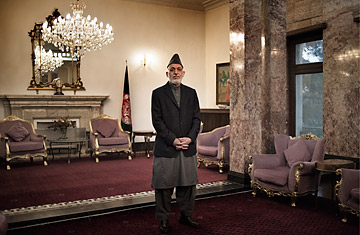
Pressure on Afghan President Hamid Karzai will increase as NATO begin to leave his country.
(4 of 10)
Given this morning's assassination, Rabbani's, the others, the terrorism, the IEDs, the numbers of casualties, do you think its more important to defeat the Taliban or to attempt to bring them to the table?
Defeat where? I have said...Command and control centers in the sanctuaries, defeat them. Fighting them in Afghanistan is not defeating them. It is adding to the fire. Because...unless you address thesanctuaries, it will not help. But there are other aspects to this. There are some Taliban who...or some individuals, I like to put it that way, who are ideologically against Afghanistan's vision for the future. And for today. There are some Taliban who are with al Qaeda, who are with terrorist networks, in the grips of foreign intelligence agencies, who we cannot reconcile or who would not come to reconcile with us and withwhom we are not seeking reconciliation. But there are other Taliban, who have been driven out of their homes, by the mistakes of NATO and American forces and by the mistakes of the Afghan government. Their homes were violated, they were driven out of their homes, they were forced to flee against their own country and take a gun against their own people. Those Taliban are not the enemies of their own people, they are Afghans like any Afghans, and they are welcome to come back and that is who we are trying to bring back. And there are thousands of Taliban in the Afghan villages who are driven by these factors who should be brought back to Afghanistan. Night raids, what a terrible thing in this country, that drove so many people out of desperation to take up guns against their own country, their own people. That is what I am talking about when I say reconciliation, and that is what we should be seeking.
Some initial discussions about starting talks have stalled recently over the reluctance to release these 5 detainees from Guantanamo bay. How important is the transfer of those detainees is to the current state of negotiations?
Hmm. Takes sip of coffee. Now...we sent a delegation to Guantanamo to meet with those prisoners. We asked them that whether they were willing to go to Qatar as part of a deal. They said they were willing to go to Qatar. Not as prisoners but as people who would go to Qatar to rejoin theirfamilies. That we support. If those five prisoners are willing to go to Qatar out of their own decision and will, we will back this, and we support this and we have done it. And we have communicated to the U.S. government as well. So this is good for the process and we should support it. There are also about 20 more Afghans there. Who are innocent, to the extent that we know, and whose release we are seeking from Guantanamo back to Afghanistan. Therefore we are in support of any release of those in Guantanamo back to Afghanistan or back where they are willing to go.
Do you think it will help the peace process?
Yes it will.
How?
Well it just gives an indication of a willingness to engage in the peace process. So far that indication is not coming.
From the U.S.?
Yes.
So to your knowledge, what is holding the U.S. up?
I have no idea.
Have you been putting pressure on the U.S. to release these five prisoners?
Yes, we have been doing that.
And the response has been?
Not positive at all.
Can the process continue without the release of these detainees?
As far as Afghanistan is concerned the process will continue by all means.
But this stall or slow things down?
It doesn't slow things for us. No we will continue to work for the peace process as we have, and we will continue to seek the release of these prisoners in Guantanamo and also the ones who are in Bagram, up to the time where the transfer is completed to Afghanistan. After that is the Afghan law that will take over.
The Taliban I speak with, tell me that they want nothing to do with the Afghan government. They feel that the power is with the U.S., and that they must negotiate first with the Americans. Are you being sidelined?
Well, they are talking to us.
But they say they are not. Why do they say they are not talking to you.
They are talking to us. I don't know why they say they are not.
